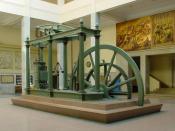Critically examine the political and social effects of industrialisation in 170 -1850 Industrialisation occurred in many countries, each taking a different approach to the implementation of new machinery and technology. The most notable for leading the way in industrialisation is Britain. Industrialisation not only made dramatic changes in the economic structure of countries but also in the social and political areas of countries.
Industrialisation led to much upheaval, especially socially since the whole way of life was changing. The emergence of the working class and the growing divide between classes also meant that a new political and economic structure was developed: capitalism.
Industrialisation began in Britain since there was a large supply of coal and steel and it was seen as one of the greatest colonial powers, thus allowing it to gain the capital and market needed to industrialise. Since Britain led the way for industrialisation, it could be seen to epitomise the effects that it had on countries.
One of the social effects that industrialisation had was that the 'rhythm of life changed' . Pre-industrialisation, people were based mainly in rural areas. However, when the enclosure of land became popular in the 1760's, farmers who were tenants began to be pushed of the land. This along with the establishment of new urban towns and cities meant that people started to move away resulting in 'English peasant villages being destroyed' .
Land enclosure was only one reason why people moved to the new urban areas. The other was the fact that new machinery was making families handicrafts of little commercial value, meaning that they were not able to survive on the money they made. This meant that the promise of a rise in wages appealed to a great many people in the rural areas, resulting in yet more change...


